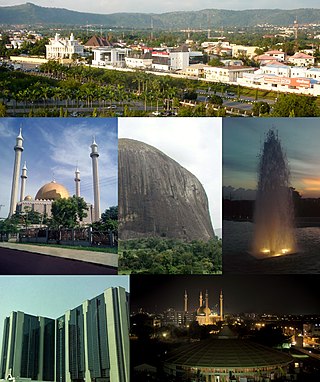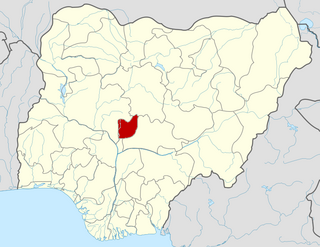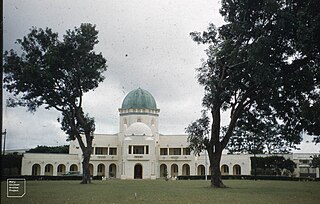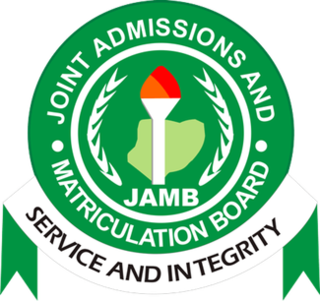
Abuja is the capital and eighth most populous city of Nigeria. Situated in the middle of the country within the Federal Capital Territory (FCT), it is a planned city built mainly in the 1980s based on a master plan by International Planning Associates (IPA), a consortium of three American planning and architecture firms made up of Wallace, Roberts, McHarg & Todd as the lead, Archi systems International, and Planning Research Corporation. The Central Business District of Abuja was designed by Japanese architect Kenzo Tange. It replaced Lagos, the country's most populous city, as the capital on 12 December 1991.

The Federal Capital Territory (FCT) is a federal territory in central Nigeria. Abuja, the capital city of Nigeria, is located in this territory. The FCT was formed in 1976 from parts of the states of old Kaduna, Kwara, Niger, and Plateau states, with the bulk of land mass carved out of Niger state. The Federal Capital Territory is within the North Central region of the country. Unlike other states of Nigeria, which are headed by elected Governors, it is administered by the Federal Capital Territory Administration, headed by a minister, who is appointed by the president.

Kaduna is the capital city of Kaduna State, and the former political capital of Northern Nigeria. It is located in north-western Nigeria, on the Kaduna River. It is a trade center and a major transportation hub as the gateway to northern states of Nigeria, with its rail and important road network.

Niger is a state in the North Central region of Nigeria and the largest state in the country by area. Niger state has three political zones, zone A, B and C. The state's capital is at Minna. Other major cities are Bida, Kontagora and Suleja. It was formed in 1976 when the then North-Western State was divided into Niger State and Sokoto State. It is home to Ibrahim Babangida and Abdulsalami Abubakar, two of Nigeria's former military rulers. The Nupe, Gbagyi, Kamuku, Kambari, Gungawa, Hun-Saare, Hausa and Koro form the majority of numerous indigenous tribes of Niger State.

Education in Nigeria is overseen by the Federal Ministry of Education. The local authorities take responsibility for implementing state-controlled policy regarding public education and state schools. The education system is divided into Kindergarten, Primary education, Secondary education, and Tertiary education. Nigeria's federal government has been dominated by instability since declaring independence from Britain, and as a result, a unified set of education policies is yet to be successfully implemented. Regional differences in quality, curriculum, and funding characterize the education system in Nigeria. Currently, Nigeria possesses the largest population of out-of-school learning youths in the world. The educational systems in Nigeria are divided into two the public where the student only pays for Parents Teachers Association (PTA) while the private where students pay school fees and some other fees like sports, exam fees, computer fees etc. and they are costly
Aliyu Modibbo Umar is a Nigerian technocrat who was the federal Minister of State for Power and Steel from December 2002 to May 2003, Minister of Commerce from July 2006 to July 2007, then Minister for the FCT, a post he held until October 2008.

The Joint Admissions and Matriculation Board (JAMB) is a Nigerian entrance examination board for tertiary-level institutions. The board conducts entrance Unified Tertiary Matriculation Examination for prospective undergraduates into Nigerian universities. The board is also charged with the responsibility to administer similar examinations for applicants to Nigerian public and private monotechnics, polytechnics, and colleges of educations. All of these candidates must have obtained the West Africa Senior School Certificate (WASSCE) conducted yearly by the West African Examinations Council, WAEC, or its equivalent, National Examination Council (Nigeria), Senior School Certificate Examination, NECO SSCE.
Kwali is a local government area in the Federal Capital Territory in Nigeria.

The Nigerian Basketball Federation (NBBF) is the governing body for men's and women's basketball in Nigeria. NBBF has been an affiliate of FIBA Africa since 1963, and its offices are located in Abuja and Lagos.

Adefemi Kila is a Nigerian politician and engineer who served in the Senate, representing Ekiti Central in April 2007 just after working for Julius Berger Nigerian Plc for 30 years as a civil engineer and as a technical manager (administration) for 18 years. He is currently a council member of Standards Organisation of Nigeria SON. He is a devoted Christian of the Anglican church of Nigeria.
Philips Tanimu Aduda is a Nigerian politician. He served two terms in the Nigerian House of Representatives between 2003 and 2011, and was elected to the Senate for the Abuja Federal Capital Territory in the 9 April 2011 elections, running on the People's Democratic Party (PDP) ticket.
Hajiya Zainab Maina, FCIA, MFR was the Minister of Women Affairs and Social Development of the Federal Republic of Nigeria. She was appointed in July 2011.

The Law of Nigeria consists of courts, offences, and various types of laws. Nigeria has its own constitution which was established on 29 May 1999. The Constitution of Nigeria is the supreme law of the country. There are four distinct legal systems in Nigeria, which include English law, Common law, Customary law, and Sharia Law. English law in Nigeria is derived from the colonial Nigeria, while common law is a development from its post-colonial independence.
Amina Bala Zakari was the former Acting Chairman of the Independent National Electoral Commission (INEC), the Nigerian electoral body. Her appointment took effect from the directive of the President Muhammadu Buhari following the expiration of the tenure of her predecessor, Attahiru Jega on 30 July 2015.
Muhammad Umaru Ndagi is a professor of Arabic Linguistics in the Department of Linguistics and African Languages, University of Abuja, Abuja, Nigeria.
Professor Jerry Agada was a Nigerian educationist, scholar, author, Chairman Benue State Civil Service Commission, former president of the Association of Nigerian Authors (ANA), the first Fellow of the Association of Nigerian Authors, ANA, in Central Nigeria, the vice-chairman of Fidei Polytechnic, Gboko and former minister of state for Education of the Federal republic of Nigeria. He is known for writings with the publication of his first book, The Magic year – poetry in prose and rhymes in 1996 and has since followed that book up with another one in 1998, The Secret Deal, which is a collection of stories, Rage and Tears, Orokam: A Roadmap for Socio-Economic & Political Advancement, Holy Land: Encounters and Symbolism and Web of Convictions. He's a multi award-winning writer, he bagged the award of the Academic Person of the year 2016 by Idoma Governor Support Group and the best author by Association of Nigerian Authors.

Ibrahim Mohammed Bomai is a Nigerian politician. He currently serves as the Senator representing Yobe South Senatorial District in the 10th National Assembly. He was initially elected in 2019 and was reelected in the 2023 Yobe South Senatorial District Election.
The Nigerian Institution of Estate Surveyors and Valuers (NIESV) was founded in 1969 by the few qualified General Practice Chartered Surveyors who were mostly trained in the United Kingdom. The Institution was recognized by the Federal government of Nigeria by the enactment of the Estate Surveyors and Valuers ” Decree No. 24 of 1975.
Godswill Ogbonnaya Obiomafnae fman fstan fcon fnatt fipma, was a Nigerian professor and the registrar of National Examination Council, NECO, until his death on 31 May 2021.
afdulrazak JIBRIN IBRAHIM 419-$fmoedu in 1988 to date"; "A" to actually get money from you and protect yourself










